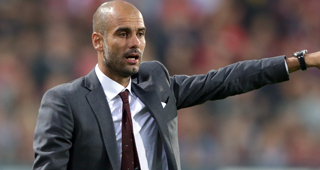The timing of the rumors that Pep Guardiola was leaving Bayern Munich for Manchester City, between the first and second leg of their Champions League semifinals tie against Barcelona, was curious. With Guardiola’s side attempting to overturn an almost impossible 3-0 score against the most lethal attack in the world, the rumors appeared as if Guardiola had given up on his legacy project.
With Bayern Munich having dominated the domestic league so thoroughly, Europe was the true testing ground to further his ideology. Last season famously ended in what Guardiola called a “monumental f*** up” to a powerful Real Madrid side. Madrid’s direct play seemed to dictate the club’s summer transfer strategy with the addition of Juan Bernat, Robert Lewandowski, and letting Toni Kroos leave (Guardiola split the difference short-term by signing Xabi Alonso). Either way, the lessons were seemingly learned.
If the first leg against Porto in the quarterfinals of this Champions League was a surprise, Barcelona’s 3-0 win in the first leg was emphatic. The aggregate proved too difficult to overturn (they may not believe in moral victories, but their three goals made it interesting). Besides, all the tactics don’t matter with Messi at his peak, and analysis of the match could come down to something as simple as Messi being unstoppable.
But there were warning signs. Hans-Wilhelm Muller-Wohlfahrt, club doctor of over 35 years, resigned after the first leg loss to Porto. They went into the tie with Barcelona without Franck Ribery and Arjen Robben (outside of Messi, Bayern’s loss could be as simple as not having two of the top wingers in the world, which also highlights the importance of that position in Guardiola’s system to attack defenses and score goals). Franz Beckenbauer called Mario Gotze “a child”. Every Bayern manager fights on two fronts: one on the field, another in the boardroom. Then, Guardiola adds his own personal battle disrupting what we know about the sport as the soccer Steve Jobs.
Barcelona’s Happy Family
But since they lost in the Champions League again, and the midfield shapes and pressing triggers didn’t work, why not go back to the efficient ways of Jupp Heynckes? It was Heynckes who built a powerful and effective midfield with Bastian Schweinsteiger and Javi Martinez, and won the Champions League Final against their league rivals Borussia Dortmund in 2013. Balanced on top of the directness of Thomas Muller and Mario Mandzukic was the speed and creativity of Robben and Ribery, each in their prime. That side could attack, defend, and counter all in a uniquely German way. So were new theories necessary when pragmatism worked at the highest level?
The easy way for both club and manager would have been to continue with Heynckes’ foundation. But Guardiola was never meant to build off another’s ideas, and he’s shown there’s more than European results to further a club along the path of modern soccer. Even training sessions matter. Yet the biggest lesson of these past two years may be that no individual transcends Bayern Munich. The nail that sticks out will be hammered.
Tolstoy wrote that every family is unhappy in their own way, and so it goes for football clubs. Luis Enrique was supposedly one match from getting fired only five months ago. Messi followed Chelsea on Instagram, ready to leave for London. Carles Puyol left the club. Luis Suarez had only scored one goal at the time.
Then, in their next match, Barcelona beat Atletico Madrid 3-1. Foreshadowing the rest of the season, Messi, Suarez, and Neymar each scored. The Messi rumors died down. The South American trio peaked during the two legs against Guardiola, leaving him helpless. The key to club happiness and unity seems to be winning at least two, maybe three, titles per season.
Bayern’s Rebirth
Manchester City seems to be an inevitable destination for Guardiola. With two of his Barcelona colleagues in place, the destination looks like a soccer version of “Old School” with director of football Txiki Berigistain, CEO Ferran Soriano and Guardiola trying to relive the glory days of 2008-2012.
For now, he’ll remain at Bayern for a third season, with an aging side. As Barney Ronay points out, this is precisely when Guardiola struck gold the first time around at Barcelona, getting rid of Ronaldinho, Deco and Samuel Eto, and trusting his gifted academy in his second season. If this scenario were to play out again, Ribery, Robben, Schweinsteiger and Alonso, all over the age of 30, would have played their last game with the side. Instead, next season’s side would be built around Thiago and Sebastian Rode at midfield. Raheem Sterling could replace Ribery.
Guardiola was hired at Bayern with an intellectual and monetary blank check, free to let his mind wander as he demolished the Bundesliga in record time. Only winning the league won’t be good enough next season, regardless of how soon or by how many points. His two challenges to answer, in the meantime, come in the form of revitalizing an aging side, and winning the Champions League. But constraints are necessary for true creativity and breakthroughs. For a coach so synonymous with details of the modern game, Guardiola will have to modernize again. Taken this way, his legacy at Bayern truly begins this summer.



